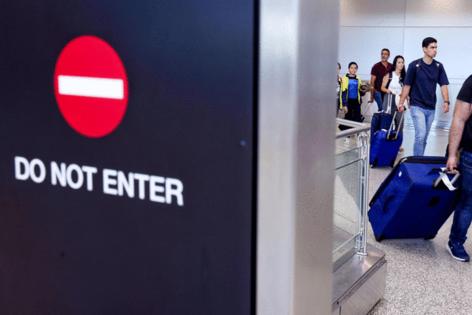Patricia Lopez: This travel ban is as pointless as the last one
Published in Op Eds
President Donald Trump has resurrected the travel ban from his first term. This time, it’s more expansive and better designed to withstand a judicial challenge. But it’s still a solution in search of a problem — and likely to cause massive disruption for U.S. residents with friends and family overseas.
The ban went into effect at the nation’s airports on Monday, affecting 19 countries. Aside from a few narrow exceptions, travel from a dozen nations will be blocked: Afghanistan, Chad, Republic of the Congo, Equatorial Guinea, Eritrea, Haiti, Iran, Libya, Myanmar, Somalia, Sudan and Yemen. Another seven face partial restrictions: Burundi, Cuba, Laos, Sierra Leone, Togo, Turkmenistan and Venezuela.
Although the first travel ban in 2017, aimed at Muslim-majority countries, sparked massive protests around the country, this broader ban has met with a far more muted response. That may indicate that Americans are becoming inured to Trump’s xenophobic policies. Or they may be overwhelmed by the sheer ferocity on display as Trump takes the unprecedented step of sending the Marines in to quell protests unfolding in Los Angeles.
It’s not clear what the administration hopes to achieve by banning visits from the poorest countries in the world. The executive order purports to “protect the United States from foreign terrorists and other national security and public safety threats,” noting that travelers in a number of the countries overstay their visas and have governments incapable of adequate vetting.
But is blocking what are mostly business and tourist visas really the best solution to address such concerns? Only three countries on the list — Cuba, Iran and Syria — are considered by the U.S. to be state sponsors of terrorism. And most terrorists in the U.S. are home-grown. The biggest terrorist threat in the country, according to the Center for Strategic and International Studies, is domestic. That’s true even if you look only at Islamic extremist attacks.
Trump specifically cited the recent Boulder, Colorado bombing by an Egyptian national here on an expired visa as an example of why the travel ban was needed. But Egypt isn’t on the list.
The administration also ignores the fact that the U.S. conducts its own extensive vetting before admitting travelers on foreign visas. That includes thorough security screenings and the collection of biometric data that can be run through national databases maintained by the Department of Homeland Security and the National Vetting Center, among others.
As to the people who overstay their visas, that is a legitimate and serious problem that also has troubled previous administrations. The Center for Migration Studies estimates that 40% of unauthorized immigrants arrived not by illegally crossing borders, but on visas that have since expired. Blocking new travel from these countries, however, is an ineffective response.
The original “Muslim ban” was halted by lower court injunctions that rightfully ruled a ban targeting a particular religion was unacceptable. Trump fought back with two more versions, until a version focusing on nations was upheld by the Supreme Court in 2018. He continued to broaden that list until the last year of his presidency. When President Joe Biden took office, he revoked the policy.
The new ban has been neatly constructed to avoid lawsuits — a triumph for an administration that has faced blue state challenges on nearly every major action.
It makes exceptions for existing visa holders and some special cases. But the special cases don’t seem to have been thought through. For example, that category includes Afghan translators who worked with U.S. troops, but not their families. It also includes the athletes, coaches and support staff for two global events scheduled to take place in Los Angeles: the 2026 World Cup and the 2028 Olympics. But it makes no such exception for the thousands of fans who might be expected to pour in from those nations.
The ban will be disruptive and cruel for many immigrant families nationwide. For example, Minnesota has the largest Somali refugee population in the U.S., along with significant refugee resettlements from Sudan and Myanmar. Habon Abdulle, the head of Ayada Leads, a Minneapolis nonprofit serving women of the African diaspora, told the Sahan Journal, a local immigrant news outlet, that the impact would be immediate and dramatic.
“The previous travel bans left behind heartbreak — weddings missed, funerals unattended, futures put on hold,” Abdulle said. “These are not political abstractions. These are human stories, interrupted.”
Nations often must make tough decisions knowing the outcome will inflict pain. If the need is demonstrable and the strategy sound, that is the price of leadership. But this travel ban does not meet those tests.
_____
This column reflects the personal views of the author and does not necessarily reflect the opinion of the editorial board or Bloomberg LP and its owners.
Patricia Lopez is a Bloomberg Opinion columnist covering politics and policy. She is a former member of the editorial board at the Minneapolis Star Tribune, where she also worked as a senior political editor and reporter.
_____
©2025 Bloomberg L.P. Visit bloomberg.com/opinion. Distributed by Tribune Content Agency, LLC. ©2025 Bloomberg News. Visit at bloomberg.com. Distributed by Tribune Content Agency, LLC.

























































Comments